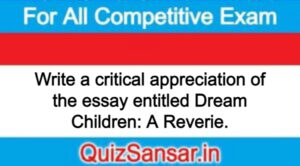
Write a critical appreciation of the essay entitled Dream Children: A Reverie.
Write a critical appreciation of the essay entitled Dream Children: A Reverie.
Ans.
Introduction: The essay entitled Dream Children: A Reverie was first published in The London Magazine in 1822. it is the reverie of a man who was intensely human and whose life was a tragedy. It was occasioned by Lamb’s loneliness. In fact, the immediate reason behind the creation of this essay was the death of his brother John, an event which filled in Lamb’s life an utter sense of loneliness and frustration. It is one of the most beautiful, imaginative, pathetic and poetic of all his essays, and is most truly a work of genius. The most remarkable feature of the essay is his vivid description, the effects of reality and his power of story telling.
Autobiographical Elements: The essay unveils the author’s soul. Lamb’s memory takes us back to those good old days of great grandmother Field. What Lamb tells about those days is true. We can see, as we read, little Lamb roaming about the large lonely rooms gazing at the marble statues. We also know about his brother John, who was just dead and how Lamb missed him. Lamb’s love for Alice Winterton who did not marry Lamb but one Mr. Bartram is also revealed through the essay. In this way, there are several autobiographical touches in the essay.
Elements of Pathos: Pathos is the keynote of this essay. There is an air of dreamy reminiscence and reflection which intensifies the pathos. The reference to the loneliness of his aged grandmother Field is tinged with melancholy. The account of the death of John Lamb (Lamb’s brother) is tragic. This account brought tears to the eyes of dream children. The end of the essay is marked by deep poignancy and heart-breaking pathos.
We are told how Lamb courted Alice W-n (Ann Simmons) for a long time without any success in his purpose. His dream children grow gradually fainter to Lamb’s view and go on receding till only two mournful faces are indistinctly seen in the distance, saying: “We are not of Alice, nor of thee, nor are we children at all……we are only what might have been.
Element of Humour : Humour is also found in this pathetic essay. The expressions and reactions of the children to their father’s statements are humorous. When Alice hears that Field was regarded as the best dancer in her youth, Alice’s right foot begins to play a movement. On hearing that Field used to sleep in a big empty house, John tries to look courageous. On hearing of his father’s love for busy idle diversions rather than for fruits, John slyly deposits back upon the plate a bunch of grapes which he had stealthily picked up from there.
His Poetic Prose: There is, perhaps, in the whole of Charles Lamb’s writings, nothing so entirely beautiful, nothing so unmistakably the product of genius, as this masterpiece of imaginative prose. It is the feeling and thought of poetry in the grab of prose, prose-poetry. It is a vision of the ‘might have been’, a vision which as it fades away with the vanishing faces of those ‘Dream Children’ leaves the reader hesitating between two conflicting emotions, admiration and pity.
Style and Language: This essay has been written in a brooding, meditative style. The language employed in it, is simple and lucid. There are no Latin expressions or phrases, and there are no compound words or coinages. There are no obsolete words either. The essay is completely free from verbal embellishments and adornments. It is free from allusions and quotations. The feeling of frustration of the writer is efficiently conveyed to us. Many sentences are long but do not confuse. The conception and emotion is poetic but has been expressed in the form of prose.
-
Write the critical appreciation of the poem No. 12 entitled Far Below Flowed.
-
Write the critical appreciation of the poem No. 11 entitled Leave this Chanting.






